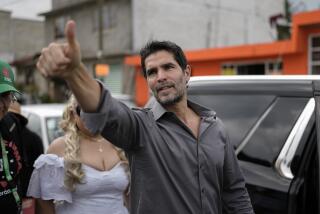Church Gets Last Word Before Filipinos Vote
- Share via
MANILA — The spirited Philippine national election campaign officially ended here the day before. But in Roman Catholic churches across the Philippine archipelago Sunday morning, priests combined Mother’s Day sermons with final appeals to the country’s 34 million voters to elect “clean and moral” leadership.
“Let God’s goodness and guts be victorious over guns and goons,” one priest announced from the pulpit in a nationally televised morning Mass.
Just ahead of today’s election, polls showed Vice President Joseph Estrada, 61, with a commanding lead over nine rivals for the presidency. But church leaders, notably the country’s most powerful prelate, Cardinal Jaime Sin, have openly opposed Estrada, a former movie actor, claiming that he is morally unfit to lead the country.
Estrada, famous for his poor-boy-makes-good film roles, admits to a past as a hard-drinking philanderer but says he has mended his ways since he took up politics, starting 20 years ago as a small-town mayor.
The Mother’s Day sermons were widely viewed here as one final, albeit indirect, swipe at the Estrada candidacy. On Saturday, the mustached former matinee idol received a surprise rejection from another church group, the 8.5-million-member Catholic charismatic movement El Shaddai, which endorsed House Speaker Jose de Venecia, 61, the candidate also favored by outgoing President Fidel V. Ramos. Gerry Barican, an attorney and political columnist, views the El Shaddai endorsement as the result of a last-ditch Ramos government effort to swing votes to De Venecia, whose campaign failed to inspire much public enthusiasm.
“With the religious bloc,” Barican said, “they are hoping to help De Venecia catch up. Since he has no charisma of his own, they are hoping to get votes for him wholesale that they couldn’t get for him retail.”
Another bloc vote sought by the De Venecia campaign is the country’s several million coconut farmers. In the 1970s, under the regime of the late dictator Ferdinand E. Marcos, a controversial levy was applied to coconut oil transactions. For years, there has been a political debate as to whether the fund, which was reinvested and is now valued at more than $2.5 billion, is public or private.
Although the courts will have the final say, Ramos recently declared that the fund will be used to help poor farmers. “Again, it was an attempt to win blocs of votes for De Venecia,” Barican said.
Despite these efforts, however, polls show Estrada holding 33% of the vote compared with only 13% for De Venecia. Former Manila Mayor and Police Chief Alfredo Lim, 68, and Sen. Raul Roco, 56, follow, each with about 11% in the polls. Lim is supported by former President Corazon Aquino, who rose to the Philippine leadership in 1986 in a “people power” campaign after her opposition politician husband, Benigno Aquino, was assassinated on the tarmac of the Manila airport.
Estrada won a boost over the weekend from the other famous Philippine widow, Imelda Marcos. Marcos was originally a candidate for the presidency herself but dropped out of the race and, on Saturday, endorsed Estrada. Political analysts say that could add 2 percentage points to Estrada’s vote total.
*
Today, an estimated 80% to 85% of the electorate is expected to go to the polls to also pick a vice president and House of Representatives, one-half of the Senate and thousands of local positions.
However, final election results are not likely to be known for days, as they are generally slow to come in from remote islands and rural areas where most of the 175,000 voting precincts, each staffed by three schoolteachers, are located. The state election commission announced Sunday that special security control will be placed over 63 provinces where election violence or irregularities are feared.
Today, cockfighting, guns and alcohol consumption have been banned as part of the effort to avoid violence. In the three-month run-up to the election, at least 27 people were killed and 35 injured in campaign-related violence.
In general, the press has been lukewarm about the candidates.
“At no other time in our electoral history has the decision been harder to make,” editorialized the Manila Times.
More to Read
Sign up for Essential California
The most important California stories and recommendations in your inbox every morning.
You may occasionally receive promotional content from the Los Angeles Times.










